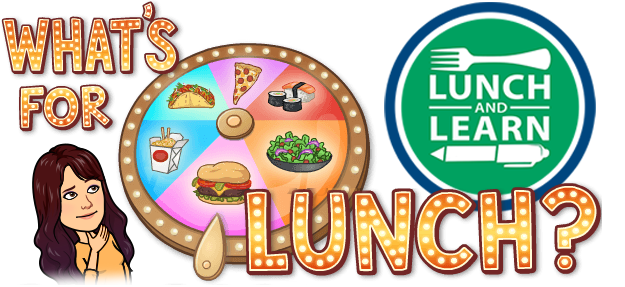
Lunch & Learn
CCIT FALL TRAINING SERIES
11:00 am – 12:00 pm
Bite-sized professional development to discuss
instructional ideas and technological integration.
![]()
Lunch & Learn Summer Break
Lunch & Learn is done for Spring 2024. Taking a break during the Summer and hope to see you back for the Fall 2024 Lunch & Learn! Please browse the previous Lunch & Learn topics below to find many ideas that can help you improve your courses!

Previous Lunch and Learn Recordings

Foundational Teaching Strategies: Inclusive Practices Part 2
Thursday, May 9: In this session we continue our discussion of inclusive classrooms. We learned in our last Lunch and Learn that inclusive classrooms ensure that diversity of all kinds is embraced. In addition to supporting diversity of all kinds, inclusive environments are also equitable. Inclusive classrooms are also equitable. In this session, we will discuss elements that facilitate equity for all students. This session will explore key actions taken in higher education to develop classroom dynamics. We will discuss methods of culturally responsive teaching, accessible materials, and attracting students to student hours.

Foundational Teaching Strategies: Inclusive Practices Part 1
Thursday, April 25: When students feel included and that they belong in your classroom, it supports their success. Building an inclusive classroom environment is a foundational strategy to student success. In an inclusive classroom, students from various backgrounds, including different races, ethnicities, genders, sexual orientations, abilities, socioeconomic statuses, and belief systems, feel welcomed, respected, and supported. In this session, we’ll address some common assumptions that might occur and methods of overcoming these. We’ll also explore strategies to create an inclusive classroom to ensure that all student voices are heard.

Foundational Teaching Strategies: Effective Class Discussions Part 2
Thursday, April 4: There are specific strategies that enhance classroom discussions. We will explore the strategies that are proven to be effective for and enhance asynchronous and synchronous discussions. We will also explore which strategies overlap for effective use in any learning modality.
Foundational Teaching Strategies: Effective Class Discussions Part 1
Thursday, March 28: Class discussions are a key element in creating a classroom environment that provides for student voice, motivation, and engagement. Additionally, these discussions allow for informal assessments of student learning. This session explores the difference between asynchronous and synchronous discussions as well as strategies to implement effective online discussions in any modality of learning. We will also investigate factors that contribute to effective discussions.
Foundational Teaching Strategies: Active Learning - Part 3
Strengthening Student Motivations and Metacognition
Thursday, March 7: In this session, we will discuss strategies for motivating students in any modality! No matter if you have students in the classroom, via Zoom, or teach asynchronously, these strategies draw on metacognition that helps students deepen their understanding of your course content and enhances their ability to master course objectives.
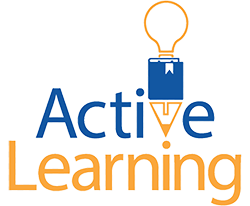
Foundational Teaching Strategies: Active Learning - Part 2
Supplementing Lectures with Partner or Group Work
Thursday, February 22: Working with a partner or group work can be a daunting strategy for you to implement and can also be a challenge for your students. In this session, we will explore some of the reasons behind these issues and will also discuss proactive strategies that set students up for successful group work; they might even enjoy it with these tried and true strategies!
Foundational Teaching Strategies: Active Learning - Part 1
Supplementing Lectures without Major Modifications to Course Structure
Thursday, February 8: An active and engaging course provides a rewarding experience for both the instructor and the students in the course. In this session, we will explore strategies to supplement your lectures and strengthen your delivery. The best part is that you will be able to implement these strategies in your course right away and they will not alter your course evaluation measures or the curriculum set forth in your syllabus.
Foundational Teaching Strategies: Classroom Management Part 2
Thursday, January 25: Classroom management is much more than just behaviors and seating, it includes developing your presence, impactful class initiation and closure strategies, and mastering the art of balancing meticulous planning with adaptability. We’ll talk about strategies to capture teachable moments. This is Part 2 of the Classroom Management series, but if you missed Part 1, you will still gain valuable insights into foundational teaching strategies.
Foundational Teaching Strategies: Classroom Management Part 1
Thursday, January 11: Classroom management may seem straightforward, but it can sometimes be more complicated. Join CCIT in a two-part series to elevate your classroom management game and uncover the secret behind creating engaging courses. Whether you are a seasoned professional or a novice faculty member, join us to transform your teaching approach and empower your students’ educational journey!
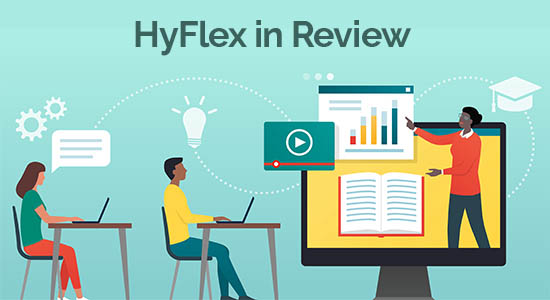
HyFlex in Review: A look back at the first semester with those who were on the front lines
Wednesday, December 13: In this session, we will hear from some instructors that taught HyFlex courses this past semester. We will hear about successes, challenges, lessons learned, and how they are planning to improve and grow based on their experiences. If you are curious about how HyFlex might work for your class, this is a great chance to hear from those who have actually taught using this new format.
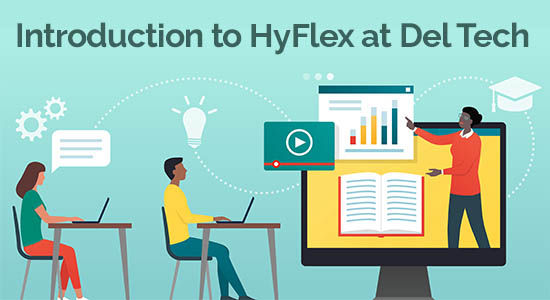
An Introduction to HyFlex at Del Tech
Wednesday, November 29: In this session, we will cover a brief history of HyFlex in Higher Ed, discuss what we mean by HyFlex here at Delaware Tech, and begin to unpack the basic building blocks of a HyFlex course. This is intended to be a basic overview, but you can come with any and all questions you might have around HyFlex and I will do my best to answer them.
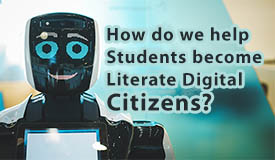
How Do We Help Students Become Literate Digital Citizens?
Wednesday, November 8: In this session, we will talk about the role of educators in helping students develop digital literacy skills. We discuss teaching students to evaluate AI-generated content critically and make informed decisions about when and how to incorporate AI-generated content in their academic and professional plans.
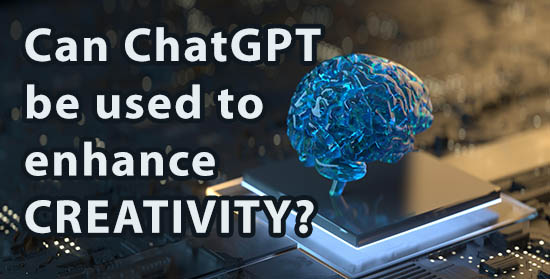
How Can ChatGPT Be Used to Enhance Creativity?
Wednesday, October 25: In this session, we’ll explore AI generators that can be used to inspire creativity in students. We will discuss some assignments or projects that could be infused into courses right away.
Can ChatGPT be a Learning Tool or is it a Threat to Education?
Wednesday, October 11: In this session, we will discuss whether AI generators are a threat to the educational process or have the potential to be used as valuable teaching tools. We will explore a few different AI generators and discuss the pros and cons
How Can We Use Something like ChatGPT Ethically?
Wednesday, September 27: This session will address the ethical implications of using AI generators in academic contexts. We will explore plagiarism, copyright infringement, and student/educator responsibility to ensure originality in submitted assignments.
What is ChatGPT, Anyway?
Wednesday, September 13: This session is an overview of what AI Generators are and how they work. We will explore the underlying technology behind the systems. We will also discuss different types of AI Generators. Yes! There are more than just ChatGPT!
DEI Competencies
Wednesday, May 31: In this final Lunch and Learn this semester, we’ll explore some competencies across the learning continuum to help recognize the extent to which we are serving our students with a lens on DEI.

Take Time for Self-Care
Wednesday, May 17: Did you know that sometimes the best way to take care of your students is to figure out how to take care of you? In this Lunch and Learn, Karianne and Laura will help you find some ways to preserve your sanity!

Share Awareness of Institutional Supports
Wednesday, May 3: Have your students ever asked you questions about college resources that you didn’t know the answer to? Do you need to know about resources that are available to support students? This Lunch and Learn is for you! Karianne and Laura will help you discover resources and ways to share them that reduce the possible stigma attached.

Develop a Communication Plan
Wednesday, April 19: Another way that we can demonstrate caring for students is through communication plans. In this Lunch and Learn, Karianne and Laura will discuss instructor presence, building a community, and ways that you can leverage technology in communication.

Assess Your Students with Care
Wednesday, March 29: Continuing to care for students, we want to review our assessments? Are they authentic, do we provide valuable feedback, do we use rubrics? These are all questions to consider in this Lunch and Learn where Karianne and Laura lead a discussion grounded in the Caring for Students Playbook.

Focus on E – Equal Access in the CARE Framework
Wednesday, March 15: We want to provide equal access to all the content in our courses. In this Lunch and Learn Laura and Karianne will discuss the element of Equal Access in the CARE Framework, and we’ll weave in tips for creating accessible courses to demonstrate caring for students from the Caring for Students Playbook.
Resource: DEI – Focus on Equal Access and Equity in CARE Framework Resource Document

Focus on R – Representation in the CARE Framework
Wednesday, February 22: When we are teaching, we want to be sure that everyone feels welcomed and comfortable in our courses. One way to ensure this is through the representation of a variety of individuals in our content. This is found in images, examples, and stories we use in our course. In this Lunch and Learn we’ll discuss the element of Representation in the CARE Framework.
Resource: DEI – Focus on Representation in CARE Framework Resources Document

Focus on A – Agency in the CARE Framework
Wednesday, February 8: How do we give students a voice in our courses? How do we provide choice in our courses? In this Lunch and Learn we’ll discuss the element of Agency in the CARE Framework.
Resource: DEI – Focus on Agency in CARE Framework Resource Document
Focus on C – Community in the CARE Framework
Wednesday, January 25: How do you build community in your classroom, whether it is online, in-person, or hybrid? How do you ensure that everyone in your course feels welcomed and included through a sense of belonging? We’ll discuss an element of CARE framework in this Lunch and Learn.
Resource: DEI – Focus on Community in CARE Framework Resource Document
What is DEI?
Wednesday, January 11: Join Laura and Karianne for the first in a series of discussions on Diversity, Equity, and Inclusion. The first session, “What is DEI?” will provide a space for everyone to come together and explore what DEI means in the context of our courses, our community, our co-workers, and our students.
Resource: DEI – What is DEI? Resource Document
Misconceptions of Online Learning: You Can't Cover as Much Content Online as You Can Face-to-Face
Wednesday, November 30th: In this final Lunch and Learn for the semester, Laura and Karianne will take you through prioritizing content by using CCPOs, the alignment of content for meaning, and visual brainstorming tools.
Misconceptions of Online Learning: Discussion Boards are Boring
Wednesday, November 16th: Wow! Discussion boards can be so boring! That’s right, unless you are inspired to use some variety in your discussion boards. In this Lunch and Learn, Laura and Karianne will present you to Flip (previously known as Flipgrid) as an enjoyable alternative to some of your discussions. We’ll also talk about other uses for this powerful tech tool.
Misconceptions of Online Learning: There Are no A-Ha Moments in Online Courses
Wednesday, November 2nd: When online courses are designed to just go through the motions, the instructor and the students can feel uninspired. Let Laura and Karianne spark your innovation with ideas about strategic use of pre- and post-reading journals and the use of effective instructor feedback to provide student follow-up opportunities in assignments and assessments. These will help your students have those “A-Ha” moments and make note of their learning progression
Misconceptions of Online Learning: Online Courses Can Only be Taught Synchronously
Wednesday, October 19th: Sometimes when we think about online learning since our big emergency shift, we only think about the way we teach synchronously with Zoom. In this Lunch and Learn, we’ll look at the ways that asynchronous instruction can support your Zoom sessions or your Face-to-Face courses through chunking material for meaning or using Muddiest Points.
Zoom Link: https://dtcc.zoom.us/j/93627251230
Misconceptions of Online Learning: Synchronous Teaching is Limited
Wednesday, October 5th: In this Zoom exploration, Laura and Karianne will take you through some advanced synchronous teaching engagement tools. These will include some new features of breakout rooms, and ideas for using chat and emojis.
Zoom Link: https://dtcc.zoom.us/j/93627251230
Misconceptions of Online Learning: Groups Can't Collaborate
Wednesday, September 21st: In this Lunch and Learn, Laura and Karianne will show you how to use collaborative tools in the Google suite. Discover ways to use Docs, Sheets, Jamboard, and Maps effectively to get students working together.
Misconceptions of Online Learning: Group Work Doesn't Work in Online Courses
Wednesday, September 7th: Join Laura and Karianne to discuss creating and using groups in online courses to strategically add engagement and challenge in your course. We’ll talk about effective discussion boards and determining appropriate project duration. Discover how group work can function in an online course.
Effective Organization in D2L
5/4/2022: We heard from students on the student panel and from survey results. Students appreciate a course that is organized. An organized course helps students be able to predict what is coming in their courses and can aid with their scheduling when arranging their lives for school, work, and family. We’ll look at some sample structures in this session that range from simple to more complicated. You find the way that works best for your course.
Effective Use of Widgets
5/18/2022: We heard from students on the student panel and from survey results. Students enjoy the ease of accessing their instructor, their Zoom meetings, their materials, and their schedules. We’ll learn about widgets that you can provide for students that share instructor information, access to external websites or resources, or contribute to organization for your students. If you’re not sure what a widget is, this is the session for you!
Student Voices Panel: Helpful Aspects of D2L
4/6/2022: Listen as students share their perspectives on the tools they’ve encountered in D2L. Discover some new tools and explore some new applications of tools that you already love. Attend Lunch and Learn sessions following this student panel and take a deeper-dive into these student validated D2L strategies and tools. Come to hear student voices and to be inspired!
Helping Students Access College Resources
3/23/2022: We heard from students on the student panel and from survey results. Students appreciate it when their instructors help their students find resources to help access books, materials, and services. This session will help identify useful resources for students that instructors can provide easily. We’ll explore templates that you can use in your D2L course, numbers and links that you can share with students, and widgets to facilitate access to resources.
Effective Videos in Courses
3/2/2022: We heard from students on the student panel and from survey results. Students appreciate it when their instructors use videos. These are introduction videos that share more about the instructor, videos that introduce a module, and how-to videos that instruct students regarding steps in process, in an assignment, or in an experiment. In this session we’ll learn about aspects of making videos that look good and effectively share information. This is NOT a professional editing session. In fact, students love it when instructors seem real and a bit unpolished. Still, we’ll talk about the skills that you need to create effective videos and some characteristics of videos that draw students into the course.
Effective Communications with Students
2/16/2022: We heard from students on the student panel and from survey results that students appreciate effective communication with their instructors. In this session, we’ll talk about ways that communication can be regular and occur frequently. We’ll talk about tools that can help an instructor manage regular communication easily. We’ll also discuss methods of ensuring that communication is substantive and has meaning for students that is individualized to the group of students currently enrolled or to individual students.
Student Voices Panel: What I love about my instructors
2/2/2022: Listen as students share their perspectives on the ways that instructors have met their needs. Discover ideas about being responsive, creating effective communication, providing essential visuals, and creating a positive classroom community. Attend Lunch and Learn sessions following this student panel and take a deeper-dive into these student validated strategies and tools. Come to hear student voices and to be inspired!
Microsoft Teams
12/8/2021 – Are you concerned about Skype going away in the new year and do you have questions about that that means for you? Want to know more about using Microsoft Teams? We will cover the basics of using Microsoft Teams as a Skype replacement and there will be time for you to ask some more in-depth questions about Teams and how it can be used for collaboration and sharing.
Google Slides Interactives
12/1/2021 – Want to get more out of the PowerPoint presentations you add to your D2L courses? What do you wish your students could do with the PowerPoints that your textbook provider gives you?
Give your PowerPoints a boost with some digital storytelling techniques and make them interactive using Google Slides.
Flipgrid
11/17/2021 – Want to interact with your students through videos? Want your students to create video presentations with shared screens easily in your classroom? Want to increase your student use of assignment feedback? Flipgrid is a great tool for all these applications. Come to Lunch and Learn to explore this free video platform that offers all these educational supports and more. You will be inspired to use Flipgrid in a way that is beneficial for you and for your students.
ThingLink
11/10/2021 – Thinglink is a free website for creating visual experiences for student-centered learning. This tech tool allows instructors or students to add content inside any image – including photos, video and audio players, web links, polls, text and more – that appear in the image when shared and viewed. Instructors can even embed Thinglinks into D2L course webpages! In this session, we will explore some Thinglinks created by instructors across the college and brainstorm ways to use Thinglinks with students.
Feedback for Course Refinement: Surveys
10/27/2021 – Do you ever wonder, what are my student’s thinking? How do you know the effectiveness of your instructional lessons and activities? Collecting meaningful feedback from your students can help you tune your course for better student understanding and better course management. During this Lunch and Learn session, we will look at methods of using Surveys and other methods for gathering information from your students that will help both you and your students have the best possible learning experience.
Padlet
10/13/2021 – Padlet is a free online collaboration tool that is fun, colorful, and easy to use. In this session, we will explore some ways to integrate this online bulletin board tool into your course.
Fostering Feedback: Intelligent Agents
09/29/2021 – Fostering Feedback! Want to learn ways to provide regular, meaningful feedback to your students without a lot of work? Intelligent Agents increase responsiveness to students by setting response emails to be sent. You control the agent, and the agent does the work. Congratulate students for an excellent quiz score. Remind students to log in regularly. Let students know if they missed a step in an assignment. Use all the knowledge you have from instructing the course to set message delivery based on certain criteria. Let D2L do some of the communication work and free you to deliver effective content.
Online Learning Consortium Resources
09/15/2021 – At Delaware Technical Community College, we have access to the Online Learning Consortium (OLC) and that means that you can access all the materials at the member level. These resources are provided to help you grow professionally whether you are interested in reading research or participating in a certification program. You can also add to your CV with opportunities to contribute to the blog, volunteer as a journal reviewer, or present at the upcoming conference. Come to this Lunch and Learn to learn about your access as a member to the OLC.
Course Readiness Checklist, Are You Prepared?
09/1/2021 – Is Your Course Ready? Even if your course has begun, do you have all the needed elements? As you gear up to teach this fall, it is important that you feel confident in your course readiness. This Lunch and Learn will review a checklist that guides you through different elements and associated tasks when preparing your course to make sure you are ready for your students!
Surveys
05/20/2021 – Surveys are useful informal tools for collecting data from students. The data collected may be in the form of Exit Tickets, Learning Styles Surveys, or Mid-Course Evaluations. In this Lunch and Learn discover how to create surveys and see how data is reported. Additionally, see the student experience with surveys.
Rubrics in D2L
04/13/2021 – Rubrics are a powerful tool to use for scoring constructed responses. Rubrics help an instructor be consistent when grading an assignment such as a paragraph, an essay, or a lab report. Rubrics, when shared amongst instructors, increase the likelihood that scoring for students in different sections of the same course will be consistent. Rubrics can also be shared with students before they complete a task to serve as a guide to increase the quality of the product. D2L offers a Rubrics tool to facilitate the implementation and sharing of rubrics. In this Lunch and Learn, hear tips from colleagues regarding rubric use and see what the student experiences in D2L.
Groups in D2L
05/06/2021 – Everyone seems to have a different reaction when they think about working in groups. This Lunch and Learn shows how exciting and useful groups can be. Explore not only great reasons to use groups in your D2L course, but learn about the utility of those groups. For instance, have students self-enroll in a group, that you have set up in which student identify their mastery of the week’s assignment. Provide resources that are directly applicable to the support that the student needs! Watch and learn more about the magic of groups in D2L.
Assignments and Annotations
04/29/2021 – Save yourself from printing student assignments, writing your comments, scanning the documents, and uploading to each student. Instead enjoy the ease of using the annotations tool to provide feedback to students digitally. Bonus Material: Get a peek at how students see their annotated papers.
Feedback in D2L
04/22/2021 – Students need valuable feedback from their instructors to improve their performance. In this Lunch and Learn, explore tools in D2L used to provide feedback that students can use. SPOILER ALERT! Get a sneak peek at how students see the feedback you give them.
Quick Eval
04/15/2021 – Quick Eval is a tool in D2L that allows instructors to provide feedback to students in a timely manner. This tool is a time saver for instructors as it can show all of the assignments, discussions, or quizzes that need a response in one location. This list can also be sorted by several headings, including course or assignment. With Quick Eval, instructors can easily respond to students, and instructors can still use annotations and video responses. When instructors respond to students, they can decide to respond immediately or may choose to publish all feedback at once. After watching this Lunch and Learn, you may be interested in a Quick Eval Widget that lives on your homepage and shows you where you need respond. See the Homepages and Widgets Lunch and Learn on April 1st for support with this option.
Accessibility in D2L and Beyond
04/08/2021 – As an instructor, you want to ensure that students learn the material in your course to further their goals in life. By providing accessible materials, you provide opportunities for students who bring talent and enthusiasm to your courses who might have been hidden behind a veil of inaccessibility. In this session, learn about the Accessibility Checker in D2L making your current documents and PowerPoints accessible, and creating new materials through Microsoft templates that are designed to be accessible.
Homepages and Widgets
04/01/2021 – What is a widget? A widget is a simple software application. There are a few reasons that you would want to use a widget on your homepage. Widgets can simplify communication with your students. Widgets appear on your homepage and provide ready access to announcements, instructor information, Zoom links, and calendars. In this informative Lunch and Learn, find out how to format your homepage in D2L and add widgets to support your students.
Finding Resources
03/25/2021 – Have you ever had a problem with your password? Have you ever had an issue with D2L? This Lunch and Learn provides you with options for finding solutions to these and other concerns. An added benefit is that you can also find out about resources to provide to address student questions.
Engaging Your Students Using Intelligent Agents
03/18/2021 –
Awards and Badges
03/11/2021 – Badges and Awards are an effective means of motivating students and validating their accomplishments. In this Lunch and Learn, discover reasons to use badges and awards, how to create these tools, and how students can use these to their benefit in professional contexts.
HTML Templates for the Win!
03/04/2021 – Do you want to create attractive pages in D2L that are also accessible to all learners? HTML Templates will make it easy! Do you want to highlight information in large bulleted or numbered lists? Are you trying to use columns? Would your students benefit from a timeline? We have a template for that! Maybe you want to use interactive text that appears when students click on a tab or an accordion that unfolds with information. All of these are available as a template that will help you focus on content of your course, while you easily provide an accessible, engaging course.
